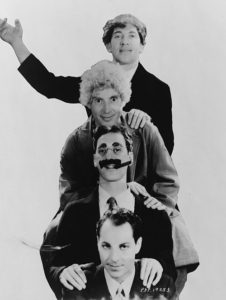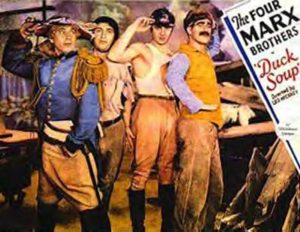[contextly_auto_sidebar]ONE of the glories of American culture is the cinematic ensemble known as the Marx Brothers. But before Chico, Zeppo, Harpo, and Groucho became anarchic movie stars in film like “A Day at the Races” and “Duck Soup,” they were an anarchic vaudeville troupe that traveled the nation. And they performed and socialized with my grandfather, a Tin Pan Alley songwriter, and his siblings, though I have never quite been clear on the details.
I corrsponded with Robert S. Bader, the author of a new book, Four of the Three Musketeers: The Marx Brothers on Stage, on Northwestern University Press.
I’ll try to fill this in a bit as I get time.
 The MarxBros are best known for movies like Duck Soup and A Night at the Opera. What made you want to look into the lesser-known chapter of their vaudeville years?
The MarxBros are best known for movies like Duck Soup and A Night at the Opera. What made you want to look into the lesser-known chapter of their vaudeville years?
I discovered the Marx Brothers when I was around eight years old, and a few years later when I was starting to learn more about them it occurred to me that they were not exactly kids when they made their first movies. I was just curious about what they were doing before the movies and this led me to spend several years researching vaudeville. Pretty soon I was not just researching the Marx Brothers in vaudeville, but the entirety of vaudeville.
How long and hard did they work the vaudeville circuits? How wide-ranging was it geographically?
Groucho started a few months before his fifteenth birthday in the summer of 1905. Gummo joined the act in 1907 and Harpo come on board in 1908. Chico was working as a song plugger for a few years before he got started in vaudeville in 1911. He joined his brothers in 1912 and the Four Marx Brothers spent the next ten years touring vaudeville in just about every corner of the United States and Canada. I was able to document them performing in at least forty states – and there were only forty-five states when they started in vaudeville. They spent a lot of time in small towns, living in fairly squalid conditions. The railroad travel was pretty rough for them with a lot of connections in the middle of the night in remote places. It was a pretty tough life.
Were the Marxes sort of superstars of that world — treated like kings wherever they went — or were they in some ways typical of it
They paid their dues in small-time vaudeville for several years. They built up a good reputation but it took some time before they were big stars. Things got better for them in 1915 when they made it to the big-time circuits. But vaudeville performers were considered social pariahs in most of the country a hundred years ago. They were not treated like kings at all. Once they moved into the world of legitimate theatre in 1923 they were more respectable. But in small towns across the country, people did not want their daughters to get anywhere near a vaudevillian. The Marx Brothers were probably among the most objectionable acts that could possibly visit a small town as far as the father of a young girl was concerned.
What kind of subculture did they come out of in New York? Tell us a bit how that relates to their gift for ethnic mimicry re Irish, Italians, etc.
They grew up in Yorkville, a largely immigrant community on New York City’s upper east side. Their mother Minnie came with her family from Dornum, Prussia and their father Sam came alone from Alsace, France. They began their lives in New York on the lower east side and moved to Yorkville in 1895. The neighborhood had been predominantly Irish before a large influx of German immigrants moved there around the turn of the century. Th ere were also a lot of Italians. There was a fair amount of nti-Semitism among the immigrants of New York City at the time, so as German Jews, the Marx boys were part of an unpopular minority. They learned to fake accents to help them get through the Irish parts of the neighborhood without getting beaten up.
ere were also a lot of Italians. There was a fair amount of nti-Semitism among the immigrants of New York City at the time, so as German Jews, the Marx boys were part of an unpopular minority. They learned to fake accents to help them get through the Irish parts of the neighborhood without getting beaten up.
What surprised you the most in your research/reporting, either specifically or generally?
There were several things. The closeness of the family – and not just the immediate family – was a revelation. Their uncles, aunts and cousins were deeply involved in the Marx Brothers’ early lives and even in their early days in show business. This was actually typical of immigrant life in New York during that period, but I was able to uncover a lot of interesting details about the extended family.
One example that may resonate for knowledgeable Marx fans involves their uncle Julius, for whom Groucho said he was named. Uncle Julius was married to Minnie’s sister Hannah. But they got married when Groucho was fifteen months old. The explanation is that Aunt Hannah married her first cousin and that Groucho was named for this man before he was his uncle. He was named for his mother’s cousin, who later became his uncle.
What role did Los Angeles play in the Marx Bros’ lives, especially their vaudeville career? I think of them as a bunch of New York boys, but at least one of them is buried at Forest Lawn.
They all eventually settled in southern California in the 1930s and lived there for the rest of their lives. But in their early vaudeville days the west coast was not really a consideration. They first played Los Angeles in 1911 on tour of the Pantages circuit, which they played again in 1913. Once they moved up the hierarchy a bit they were regulars on the Orpheum circuit and made regular visits to Los Angeles beginning in 1915. But when they started out in vaudeville Los Angeles might as well have been China. They were mostly working in the northeast and south until that first Pantages tour.
Indulge my family pride for a moment. My grandfather Sammy Timberg used to tell fond stories of traveling with the brothers and rooming with Groucho. Did you find descriptions of him or his siblings Herman and Hattie?
The Marx Brothers worked with the Timbergs in 1921. It was a pretty brief association. Herman Timberg, who had been a big star in vaudeville as a child, became a producer and wrote a new show for them called On the Mezzanine Floor, which was also called On the Balcony. It opened in February 1921. The Marx Brothers purchased the show from Timberg in October and they continued in it for another year.
Herman produced this show with boxer Benny Leonard as the major investor. Leonard was dating Herman’s sister, Hattie. Her stage name was Hattie Darling and she was the leading lady in the show until she was replaced when the Marxes bought out Herman Timberg.
Herman’s brother Sammy was a composer and musical director and he worked on the show as well. If Sammy and Groucho roomed together on the road, it would have been after Groucho’s wife Ruth left the company to have their first child. Arthur was born in July of 1921. The show rarely left New York while the Timbergs were involved, but there were a few road dates after Ruth probably off the tour.
I did find documentation for a performance featuring Herman and Sammy Timberg and the Four Marx Brothers. There was a benefit for the Sidney Ascher Camp at the Hotel Pennsylvania in New York on March 20, 1921 while On the Mezzanine Floor was playing at the Palace Theatre. The principal acts on the bill were the Four Marx Brothers, Benny Leonard, Eddie Cantor and Herman and Sammy Timberg.
In one of those odd coincidences that turn up in show business history, Hattie Darling’s replacement in On the Mezzanine Floor was Helen Schroeder, who later gained fame under her married name Helen Kane with her recording of “I Wanna Be Loved By You.” She became the inspiration for Max Fleischer’s popular cartoon character Betty Boop, and of course you know, Sammy Timberg became quite a success as the musical director of the Fleischer cartoons.

I am a little surprised that you do not seem aware that during their film years, the Marx Brothers took their film scripts on the road to try them out theatrically. Unless I have been misinformed.
am not an authority on the marx bros — just an interested party
I love reading about Julius, Adolph, Leonard, Milton, and Herbert. I’d always look around for their residence when playing up at the 92nd Street Y, which had to be close to the Frenchie/Minnie apartment. I wonder if mimicking tough Irish kids was a known survival skill or if this is in any way a good guess – like exactly the way the boys got their names. Being a sometime Dayton boy myself, I know Groucho was fond of the B.F. Keith Theater there (one of the grandest in the whole circuit) and had a marvelous time touring the National Cash Register Company. Sadly, the hotel where they likely stayed was imploded not that long ago. I do have a program from their Coconuts national tour from ’28 or so. I’m most pleased to have it.
(By the way, there are two type-o’s in the article.)
Sort of like Elvis copying black music for a white audience, Helen Kane copied Baby Esther Jones and Josephine Baker in the boop-owp-ee-doop category. They were black vaudeville performers who have a place in Black Women’s History. An early recording of Baby belied Helen’s claim to Betty Boop fame!